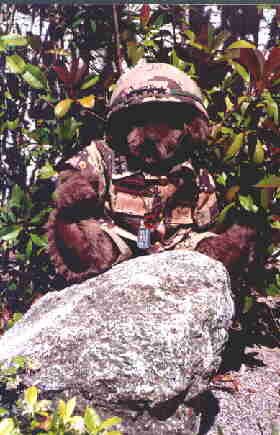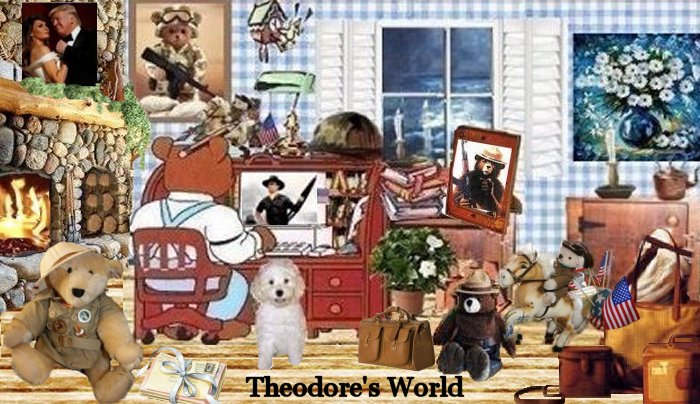« Charles Krauthammer: "Obama Has No Intention to Solve the Fiscal Issues" | Main | Taxpayers To Start Feeling ObamaCare’s Effects...You Can Thank Obama and His Voters »
December 28, 2012
Desert Storm commander Gen. Norman Schwarzkopf dies
U.S. General Norman Schwarzkopf, who led the United States to a decisive victory in the first Gulf War, has died in Tampa, Florida.
Desert Storm commander Norman Schwarzkopf dies
Truth is, retired Gen. H. Norman Schwarzkopf didn't care much for his popular "Stormin' Norman" nickname.
The seemingly no-nonsense Desert Storm commander's reputed temper with aides and subordinates supposedly earned him that rough-and-ready moniker. But others around the general, who died Thursday in Tampa, Fla., at age 78 from complications from pneumonia, knew him as a friendly, talkative and even jovial figure who preferred the somewhat milder sobriquet given by his troops: "The Bear."
That one perhaps suited him better later in his life, when he supported various national causes and children's charities while eschewing the spotlight and resisting efforts to draft him to run for political office.
He lived out a quiet retirement in Tampa, where he'd served his last military assignment and where an elementary school bearing his name is testament to his standing in the community.
Schwarzkopf capped an illustrious military career by commanding the U.S.-led international coalition that drove Saddam Hussein's forces out of Kuwait in 1991 — but he'd managed to keep a low profile in the public debate over the second Gulf War against Iraq, saying at one point that he doubted victory would be as easy as the White House and the Pentagon predicted.
Schwarzkopf was named commander in chief of U.S. Central Command at Tampa's MacDill Air Force Base in 1988, overseeing the headquarters for U.S. military and security concerns in nearly two dozen countries stretching across the Middle East to Afghanistan and the rest of central Asia, plus Pakistan.
When Saddam invaded Kuwait two years later to punish it for allegedly stealing Iraqi oil reserves, Schwarzkopf commanded Operation Desert Storm, the coalition of some 30 countries organized by President George H.W. Bush that succeeded in driving the Iraqis out.
At the peak of his postwar national celebrity, Schwarzkopf — a self-proclaimed political independent — rejected suggestions that he run for office, and remained far more private than other generals, although he did serve briefly as a military commentator for NBC.
While focused primarily on charitable enterprises in his later years, he campaigned for President George W. Bush in 2000, but was ambivalent about the 2003 invasion of Iraq. In early 2003 he told The Washington Post that the outcome was an unknown: "What is postwar Iraq going to look like, with the Kurds and the Sunnis and the Shiites? That's a huge question, to my mind. It really should be part of the overall campaign plan."
Initially Schwarzkopf had endorsed the invasion, saying he was convinced that Secretary of State Colin Powell had given the United Nations powerful evidence of Iraqi weapons of mass destruction. After that proved false, he said decisions to go to war should depend on what U.N. weapons inspectors found.
He seldom spoke up during the conflict, but in late 2004 he sharply criticized Defense Secretary Donald H. Rumsfeld and the Pentagon for mistakes that included erroneous judgments about Iraq and inadequate training for Army reservists sent there.
"In the final analysis I think we are behind schedule. ... I don't think we counted on it turning into jihad (holy war)," he said in an NBC interview.
Schwarzkopf was born Aug. 24, 1934, in Trenton, N.J., where his father, Col. H. Norman Schwarzkopf Jr., founder and commander of the New Jersey State Police, was then leading the investigation of the Lindbergh kidnap case. That investigation ended with the arrest and 1936 execution of German-born carpenter Richard Hauptmann for murdering famed aviator Charles Lindbergh's infant son.
The elder Schwarzkopf was named Herbert, but when the son was asked what his "H" stood for, he would reply, "H."
As a teenager Norman accompanied his father to Iran, where the elder Schwarzkopf trained the Iran's national police force and was an adviser to Reza Pahlavi, the young Shah of Iran.
Young Norman studied there and in Switzerland, Germany and Italy, then followed in his father's footsteps to West Point, graduating in 1956 with an engineering degree. After stints in the U.S. and abroad, he earned a master's degree in engineering at the University of Southern California and later taught missile engineering at West Point.
In 1966 he volunteered for Vietnam and served two tours, first as a U.S. adviser to South Vietnamese paratroops and later as a battalion commander in the U.S. Army's Americal Division. He earned three Silver Stars for valor — including one for saving troops from a minefield — plus a Bronze Star, a Purple Heart and three Distinguished Service Medals.
While many career officers left military service embittered by Vietnam, Schwarzkopf was among those who opted to stay and help rebuild the tattered Army into a potent, modernized all-volunteer force.
After Saddam invaded Kuwait in August 1990, Schwarzkopf played a key diplomatic role by helping persuade Saudi Arabia's King Fahd to allow U.S. and other foreign troops to deploy on Saudi territory as a staging area for the war to come.
On Jan. 17, 1991, a five-month buildup called Desert Shield became Operation Desert Storm as allied aircraft attacked Iraqi bases and Baghdad government facilities. The six-week aerial campaign climaxed with a massive ground offensive on Feb. 24-28, routing the Iraqis from Kuwait in 100 hours before U.S. officials called a halt.
Schwarzkopf said afterward he agreed with Bush's decision to stop the war rather than drive to Baghdad to capture Saddam, as his mission had been only to oust the Iraqis from Kuwait.
But in a desert tent meeting with vanquished Iraqi generals, he allowed a key concession on Iraq's use of helicopters, which later backfired by enabling Saddam to crack down more easily on rebellious Shiites and Kurds.
While he later avoided the public second-guessing by academics and think tank experts over the ambiguous outcome of the first Gulf War and its impact on the second Gulf War, he told The Washington Post in 2003, "You can't help but ... with 20/20 hindsight, go back and say, `Look, had we done something different, we probably wouldn't be facing what we are facing today.'"
After retiring from the Army in 1992, Schwarzkopf wrote a best-selling autobiography, "It Doesn't Take A Hero." Of his Gulf War role, he said: "I like to say I'm not a hero. I was lucky enough to lead a very successful war." He was knighted by Queen Elizabeth II and honored with decorations from France, Britain, Belgium, Kuwait, Saudi Arabia, the United Arab Emirates, Qatar and Bahrain.
Schwarzkopf was a national spokesman for prostate cancer awareness and for Recovery of the Grizzly Bear, served on the Nature Conservancy board of governors and was active in various charities for chronically ill children.
"I may have made my reputation as a general in the Army and I'm very proud of that," he once told The Associated Press. "But I've always felt that I was more than one-dimensional. I'd like to think I'm a caring human being. ... It's nice to feel that you have a purpose."
Schwarzkopf and his wife, Brenda, had three children: Cynthia, Jessica and Christian.
.
.
HERO!
In Vietnam in March 1970, Schwarzkopf was involved in rescuing men of his battalion from a minefield. He had received word that men under his command had encountered a minefield on the notorious Batangan Peninsula, he rushed to the scene in his helicopter, as was his custom while a battalion commander, in order to make his helicopter available. He found several soldiers still trapped in the minefield. Schwarzkopf urged them to retrace their steps slowly. Still, one man tripped a mine and was severely wounded but remained conscious. As the wounded man flailed in agony, the soldiers around him feared that he would set off another mine. Schwarzkopf, also wounded by the explosion, crawled across the minefield to the wounded man and held him down (using a “pinning” technique from his wrestling days at West Point) so another could splint his shattered leg. One soldier stepped away to break a branch from a nearby tree to make the splint. In doing so, he too hit a mine, which killed him and the two men closest to him, and blew an arm and a leg off Schwarzkopf’s artillery liaison officer. Eventually, Schwarzkopf led his surviving men to safety, by ordering the division engineers to mark the locations of the mines with shaving cream. (Some of the mines were of French manufacture and dated back to the Indochina conflict of the 1950s; others were brought by Japanese forces in World War II). Schwarzkopf says in his autobiograpy It Doesn’t Take a Hero that this incident firmly cemented his reputation as an officer who would risk his life for the soldiers under his command.
Schwarzkopf told his men that they might not like some of his strict rules, but it was for their own good. He told them “When you get on that plane to go home, if the last thing you think about me is ‘I hate that son of a bitch’, then that is fine because you’re going home alive.” Lt. General Hal Moore later wrote that it was during his time in Vietnam that Schwarzkopf acquired what later became his infamous temper, while arguing via radio for passing American Hueys to land and pick up his wounded men.
.

Wild Thing's comment................
I have always really liked this man. How sad it is for him to pass away.
R.I.P. General Schwarzkopf.
Something to share with you.............. This is one of my favorite teddybears in my collection. A Carol Black Bearhearts Original, created on October 5, 1992 in California ,Stormin' Norman is named after General Norman Schwarzkopf and is authentically dressed from his desert fatigues right down to his helmet,two watches just like the General would wear when deployed, official ID's, his backpack, rations and American flag.
He is stuffed with desert sand!

Posted by Wild Thing at December 28, 2012 02:55 AM
Comments
A true American Patriot.
You have to search real hard to find a general officer along the lines of a Schwarzkopf today. Too many of them are politically motivated and only care about their careers and retiring at that 3 and 4 star rank.
Posted by: BobF at December 28, 2012 07:07 AM
Gen Schwarzkopf lived a simple and spartan life during the Gulf War. He supposedly refused air conditioning saying he wanted to experience the existance his line troops went through. He refused political life because he wanted to maintain his morals, dignity and privacy. He is now in heaven leading St Peter's band of brothers and warriors
Posted by: TomR, armed in Texas at December 28, 2012 12:13 PM
